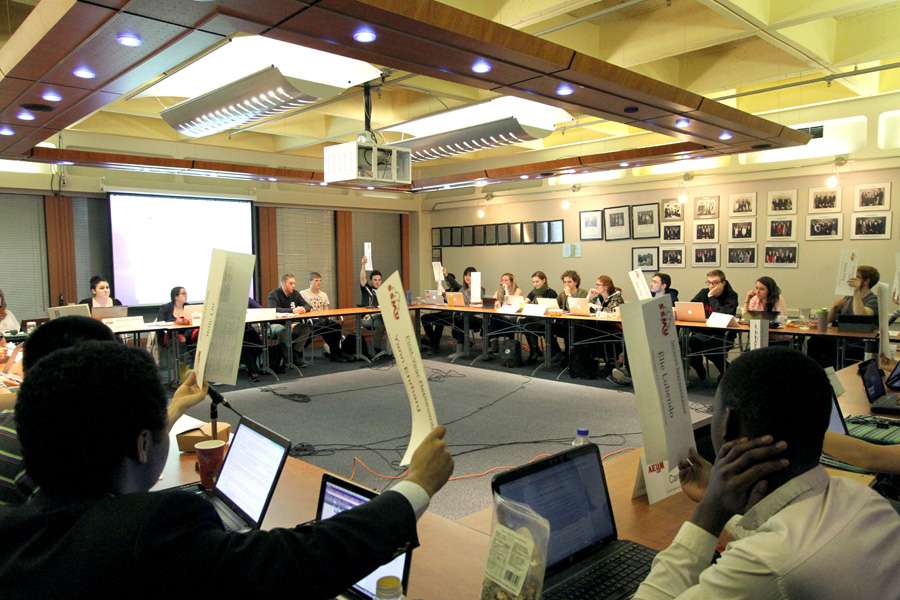Increased prices for minicourses and Gerts are possible options for the Students’ Society of McGill University (SSMU) to balance their budget following the failure of the University Centre Building Fee referendum questions.
Executives originally intended to hold a special referendum period to re-run the same question. However, bylaw limitations mean they were unable to run another referendum until September.
“The fact of the matter is that clearly we were not bombastic enough with the way we were promoting [the Building Fee],” SSMU President Katie Larson said. “Could we have run a ‘yes’ campaign? Of course. But at the end of the day, I shouldn’t have to explain to students why they should find something important [….] It’s not just the executive’s fault—it’s everybody’s fault.”
In light of SSMU’s financial uncertainties heading into the 2014-2015 academic year, Vice-President Finance and Operations Tyler Hofmeister developed the first draft of a contingency budget in preparation for the possibility that the September referendum question also does not pass.
One change is that operations SSMU initially ran to break even could potentially be run with the goal of making a greater profit—for example, mini courses and Gerts.
“We believe that we could probably keep demand [for mini courses] fairly stable while still increasing [prices] to generate a revenue,” he said. “There [would also] be increases in price for Gerts, particularly for pitchers, pints of draft beer, and potentially the end of the drink specials—we’d probably increase the price by about 50 cents.”
Other proposed changes in the draft contingency budget include freezing salaries and hiring, eliminating the Club Fund and SSMU executive retreats, and reducing the SSMU Building’s operating hours.
Hofmeister noted that after-hours access to the building costs approximately $30,000 a year due to security staffing. According to Hofmeister, cuts to hours would likely include closing the building completely on weekends and closing Gerts significantly earlier.
WalksSafe Operations Coordinator David Olmstead urged SSMU to reconsider that possibility, saying that services like WalkSafe and DriveSafe rely on access to the building after 1 a.m.
“Cutting after-hour access would be devastating to our service,” Olmstead said. “During frosh, we had over 46 individual walks, [all of which were] entirely outside of operating hours.”
Another possibility that is not currently included in the contingency budget is to replace the Nest and room 108 with commercial tenants, which could generate approximately $75,000 in revenue.
“This is obviously not a scenario we’d like to pursue,” Hofmeister said. “That being said, it’s a possibility, and knowing the financial situation that we are in right now […] solutions like removing The Nest or renting out 108 for commercial space are much better solutions for keeping [SSMU] financially sustainable in the long run.”
Even after cutting costs in this draft of the budget, Hofmeister said that there would still be roughly $20,000 left to cut. Council will vote to approve a final draft of the contingency budget at the final Council meeting of the year on April 10.
Defending SSMU members’ right to vote
Council also approved a motion for SSMU to work alongside the university to support students interested in voting in the April 7 provincial elections. The motion was brought forth in the context of recent cases where students were allegedly denied their right to vote due to interpretations of the “domiciled” requirement for all registered voters.
“We’ve been going to the media [and] lawyers for help, but we haven’t gotten any help from our university or students’ society,” Arielle VanIderstine, U0 Arts and Science, said. “The motion [would] support those students […] as they exercise their democratic right to vote.”
The motion mandates SSMU to publicly defend its members’ right to vote through a press release, as well as to provide “support and resources” to students who have been denied the right to vote.
Dissolving the finance committee
Council also approved the elimination of the finance committee, which was previously run under the vice-president of finance and operations’ portfolio with the intension of allowing councillors and other SSMU members the opportunity to review the budget.
“A lot of these councillors […] didn’t have enough information going into these meetings,” Hofmeister said. “[There would be] very long meetings where the general manager and [VP Finance] would explain what was going on in the budget, only to do so again at Council to the exact same people [….] It hasn’t been very productive.”












fuck ssmu